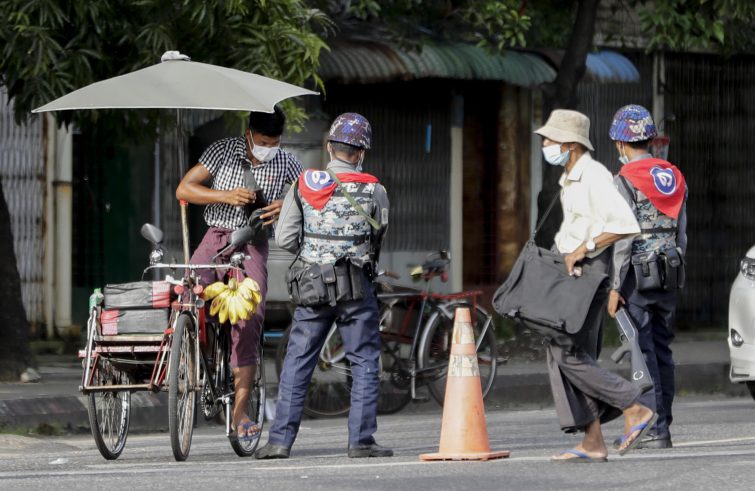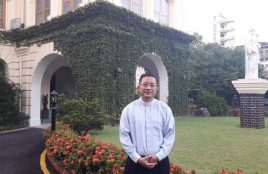
Violent military repression, the tragedy of internally displaced persons and the Covid-19 pandemic have overwhelmed by not defeated the Church in Myanmar. In fact, the Church responded to these events immediately and spontaneously by turning its largest compounds – including major seminaries, convents and spiritual retreats – into shelters, temporary clinics and hospitals. Oxygen devices are being manufactured even in the residence of the Cardinal of Yangon, Charles Bo. Msgr. John Saw Yaw Han, Secretary General of the Bishops’ Conference of Myanmar, provides an insight into “the face” of the Burmese Church, which has embarked on and is committed to pursuing the synodal path in communion with Pope Francis and the whole Church worldwide. It is the “Synod of the peripheries”.
 What does it mean to you to embark on the synodal journey at this moment in time?
What does it mean to you to embark on the synodal journey at this moment in time?
It’s a blessing. It provides us with the opportunity to share and to listen to each other with a view to encouraging greater cooperation, understanding, and mutual support. It paves the way for respect, reconciliation, peace, and for an effective proclamation of the Good News of Jesus Christ in the future. In so doing, the synod reaches out not only to the Catholic faithful, but also to the followers of other faiths and religions. Its inclusiveness sets a good example also for society as a whole.
As Pope Francis says, we become aware that the blessings we receive from God are not gifts meant for ourselves to keep, but to be shared with others. Just as we share with others what is good, we also share sorrows and sufferings through caring listening and practical support.
How can this process be carried out amidst the escalating conflict in Myanmar? Can you meet, pray, and talk together?
Given the ongoing situation in the country, organising meetings, praying and holding group discussions is extremely difficult for both political and health reasons. Depending on the different situations across the country, some dioceses might be able to offer more services, others less. In most cases we try to use Zoom for our prayer gatherings and meetings.
But some dioceses are unable to participate because they have no Internet access.
The synodal process requires the Church to lend a listening ear to the people above all. What are the pleas of the people in Myanmar? And how is the Church trying to respond to this cry?
The people of Myanmar are asking for healthcare, humanitarian aid, justice, respect for human dignity, democracy, peace and development of the country. The internally displaced people are in dire need of humanitarian and health assistance.
The Myanmar Bishops’ Conference, under the guidance of Cardinal Charles Bo, set up the Myanmar Catholic Humanitarian Assistance Initiatives (MCHAI), a national emergency response team whose mission is to provide support to the people in the areas of medical care and food distribution. The Church is striving to meet not only physical needs, but also emotional and spiritual needs through psychological counselling and spiritual accompaniment.
How have the recent hardships and sorrows changed the face of the Church in Myanmar?
At this time of difficulty and pain, the Church in Myanmar is transforming Catholic major seminaries, houses of spiritual retreat and convents, along with other church compounds, in Covid-19 quarantine facilities, oxygen supply centres, temporary clinics and hospitals. An oxygen plant factory has been set up in the cardinal’s own residence. The Church is contributing not only the use of its premises, but also medical equipment required for the sick, as well as voluntary workers. Catholic priests, nuns, deacons, seminarians and young voluntary workers alongside members of other faiths in various locations are risking their lives to help people in need. There are also qualified lay and expert clergy who are generously serving on telehealth and spiritual direction teams. Card. Charles Bo is the voice of the voiceless in the country’s struggles.
Thanks to the services offered by the Church, people realise that the Church is there for everyone, regardless of social status, religious affiliation or belief
What worries you most and what gives you hope?
National reconciliation and a peaceful solution to the ongoing crises as soon as possible is our great concern. Without peace, we have no hope of appropriate health care, quality education and development of our country. As a religious person, I believe that God will do what we cannot do for ourselves. We can trust in God’s timing, His plan and His means. I entrust my country, Myanmar, to God’s almightiness. My hope rests in God and in the solidarity of global communities.
What is your message to the Churches in the world as they embark together on the same synodal journey?
Just as we lend a listening ear to the members of the Catholic Church in the country during our synodal journey, we also heed the voices of people belonging to different faiths and religions in various parts of the world. The Church in Myanmar is grateful to all churches and people of good will for their concern and generosity and for coming to our aid at a time of great need. Let us reach out to one another in prayer and love.


